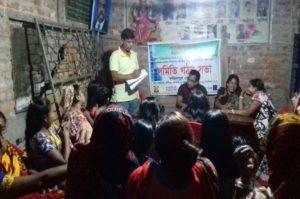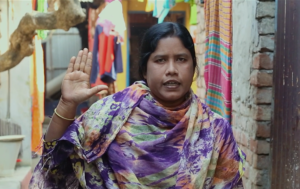Alo Rani Das – a 41-year old widow and mother of two teenage children was married at 15 years of age. Her married life lasted about 20 years, before her husband passed away from cancer. Having no other earning member in the family, Alo Rani had to shoulder the responsibility of financially supporting her family which she never thought would be her role. Without any education, skills or other options, Alo Rani started her new life providing for her family by sweeping, dusting and cleaning work in different private organizations and households back in 2012. Alo Rani, belongs to the Harijan[1] community: the low-caste people who traditionally do sanitation and sweeping work, which was the reason for choosing that particular type of work.
With all her sincere and all-day-long hard work for so poor an amount of money, she often felt numb with the thought of how to earn more. The idea blinked in her mind often of using intellect along with her physical labour to add value to her work which may enhance her earning. Doing traditional work in centuries-old traditional ways may not solve her problem. In those hard and dark days, she used to think about widows and women in her community who had to financially support their families without any skills. She saw life lead a few of them to the dark path. Alo Rani became desperate to do something not only for her but for other women who all have the right to live, and live with dignity.

2018: The journey has begun, inception meeting of the cooperative
In 2018, Alo Rani along with 31 other women sweepers/cleaners formed a cooperative aiming at social and economic stability and dignity.
With a focus to empower informal waste and sanitation workers, Practical Action started its intervention in Faridpur. Practical Action selected the cooperative which Alo Rani belonged to; introducing them to Faridpur municipality and other stakeholders who could support the cooperative to transform as a formal enterprise. In January 2019, the enterprise got registered and gained permission to operate as a private sanitation enterprise – “Modhumoti Nari Cleaner Somobay Somiti Ltd”.
Realizing the need of financial solvency for true empowerment, the cooperative started a savings programme from very beginning. By the end of 2020, its collection was BDT 70,000 (around £590). The cooperative started a credit programme with a low interest rate for members. Alo Rani, because of her honesty, fighting spirit, and spontaneous leadership was well-accepted in the society, and hence was assigned the responsibility to oversee the cooperative’s activities. Her performance helped her to contribute beyond boundary and currently she holds vital positions in various formal and informal sanitation committees including the Municipality committee.
This outstanding achievement didn’t stop Alo Rani fighting for right causes and growing in confidence as a successful woman leader like a few others. Wherever Alo Rani attends she raises her voice for a better work environment, health and safety, equal wages for women sanitation workers and women empowerment. She inspired her co-operative to start a health insurance scheme. She often uses her position and influence for the benefit of other left-out/suppressed groups to lift them up, while still recognizing her own responsibility for the cooperative. With her efforts and those of the other co-op members the scope and opportunity of the cooperative started to expand day by day.

Alo Rani: the community-based leader
Their progress was recently recognized in the award of third position in the 2019 “Showcasing Sustainable & Innovative Project Ideas” for submitting 22 brilliant ideas to the Corporate Responsibility Network (CRN). As an appreciation and recognition to her dedication and hard work, recently, the District Commissioner (DC) of Faridpur offered Alo Rani driving training with all necessary relevant support to further empower her with improved socioeconomic condition. Alo is now getting prepared to see herself as a vacutag driver.
Alo Rani started her life like the other girls of her community. Circumstances could have lead her to a wrong path after she became widow at quite a young age. She even faced a few such toxic propositions and many barriers on her chosen path but her positive outlook, strong moral values, trust in good-deeds, uncompromising desire to support the welfare of her family and wider society, took her to another level. She dreams of a society where all girls and women are encouraged to explore their potential so that they don’t need to depend on others or fall victim to abuse. This will only be possible when society treats each individual as a human being without any discrimination. Alo Rani is confident that the more women are allowed to access a position/platform where they can do some good for others, the more the girls and women will benefit by accessing opportunities equally, creating an equitable society.
She believes that she can do some good for the women of her community because she holds some power and authority as a leader of her community. As a woman she knows the pain and trauma girls and women go through, and can understand their needs: “only a woman understands what crisis, challenge, pain, problems the women go through…!” But that only makes her a stronger advocate for change.
At Practical Action, we are proud to support women like Alo, celebrate their achievements, and build them up as we work together for a world that works better for everyone.